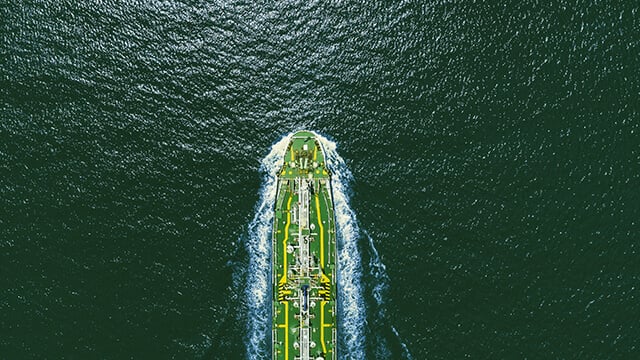Alfa Laval joins over 150 industry leaders in the call for decisive government action to enable full decarbonization of international shipping by 2050
As a signatory of the Call to Action for Shipping Decarbonization, Alfa Laval joins maritime peers in urging world leaders to align shipping with the Paris Agreement’s temperature goal. The document implores governments to facilitate the decarbonization steps already being taken in the private sector, enabling zero-emission shipping to become the default choice by 2030.
Shipping’s decarbonization is imperative
Full decarbonization of international shipping, which accounts for around 80% of global trade and 3% of today’s global greenhouse gas (GHG) emissions, is both urgent and achievable. This is the message of the Call to Action for Shipping Decarbonization, which was announced on 22 September in conjunction with the UN General Assembly.
Alfa Laval is among the over 150 signatories of the document, which will be delivered to governments ahead of critical climate negotiations at COP26 and MEPC 77 this November. It calls for policies and investments that will allow the shipping industry to decarbonize by 2050 – and make zero-emission shipping the default choice by 2030.
“Alfa Laval is proud to be part of the Call to Action for Shipping Decarbonization, which comes from leading voices across the maritime value chain,” says Sameer Kalra, President, Alfa Laval Marine Division. “We, our partners, our customers and others in the marine industry are working to achieve the decarbonization we all know must happen. The private sector can and must work faster, but a global framework of policies, resources and incentives is needed to make that feasible.”
Seeking bolder targets and actions
The existing GHG Strategy of the International Maritime Organization (IMO), adopted in 2018, aims to reduce shipping’s annual GHG emissions by at least 50% of 2008 levels by 2050. Although a major step, it is neither in line with the Paris Agreement nor enough to reach critical tipping points in decarbonizing global supply chains. Countries representing a significant majority of global GHG emissions and the world economy, as well as many companies, have committed to achieving 100% carbon neutrality within a similar time frame.
The Call to Action for Shipping Decarbonization therefore urges world leaders to:
- Commit to decarbonizing international shipping by 2050 and deliver a clear and equitable implementation plan to achieve this when adopting the next IMO GHG Strategy, set to occur in 2023.
- Support industrial-scale zero-emission shipping projects through national action, for instance by setting clear decarbonization targets for domestic shipping and by providing incentives and support to first movers and broader deployment of zero-emission fuels and vessels.
- Deliver policy measures that will make zero-emission shipping the default choice by 2030, including meaningful market-based measures, taking effect by 2025, that can support the commercial deployment of zero-emission vessels and fuels in international shipping.
Creating a path for success in decarbonization
“Through the Call to Action, we and our co-signatories are asking governments for a robust approach to climate change,” says Dr Markus Hoffmann, Business Unit Manager, Marine Separation & Heat Transfer Equipment, who has headed Alfa Laval’s work with the initiative. “Importantly, that involves not only setting more ambitious maritime goals, but also creating the conditions to make those goals achievable.”
While technologies for zero-emission vessels exist, they need to be further developed and brought up to scale. Likewise, they need to become financially viable for shipowners to adopt. National initiatives and global coordination are needed to make this happen, along with market incentives to make zero-emission fuels more attractive compared to traditional choices.
“Maritime businesses should see opportunity in taking swift steps towards decarbonization, rather than additional risk,” Hoffmann emphasizes. “Alfa Laval is at the forefront of new fuel and energy management technologies, and we believe that decarbonization can be achieved while protecting shipowner competitiveness.”
Aligned with other sustainability efforts
The targets of the Call to Action for Shipping Decarbonization are in line with the sustainability work already occurring within Alfa Laval’s scope. With the UN Sustainable Development Goals for 2030 in focus, Alfa Laval strives to continuously improve its own sustainability, aiming to be carbon neutral across the value chain by 2030. Alfa Laval is a member of the Getting to Zero Coalition, which initiated the Call to Action for Shipping Decarbonization and established the task force to develop it.
To learn more about the Call to Action for Shipping Decarbonization and to see the full list of signatories, please visit: Getting to Zero Coalition (globalmaritimeforum.org)
To learn more about Alfa Laval technologies for zero-emission vessels and Alfa Laval’s approach to decarbonization, please visit: www.alfalaval.com/marine
Editor’s notes
This is Alfa Laval
Alfa Laval is active in the areas of Energy, Marine, and Food & Water, offering its expertise, products, and service to a wide range of industries in some 100 countries. The company is committed to optimizing processes, creating responsible growth, and driving progress – always going the extra mile to support customers in achieving their business goals and sustainability targets.
Alfa Laval’s innovative technologies are dedicated to purifying, refining, and reusing materials, promoting more responsible use of natural resources. They contribute to improved energy efficiency and heat recovery, better water treatment, and reduced emissions. Thereby, Alfa Laval is not only accelerating success for its customers, but also for people and the planet. Making the world better, every day. It’s all about Advancing better™.
Alfa Laval has 16,700 employees. Annual sales in 2020 were SEK 41.5 billion (approx. EUR 4 billion). The company is listed on Nasdaq OMX.

